
Interpreter and Translator Trainer
Scope & Guideline
Elevating Standards in Linguistics and Education
Introduction
Aims and Scopes
- Empirical Research in Education:
The journal publishes studies that investigate various educational practices and their effectiveness in interpreter and translator training, including assessments, curriculum development, and the impact of teaching methods. - Integration of Technology:
A significant focus on how technology, particularly machine translation and computer-assisted interpreting, is integrated into training programs, reflecting the evolving landscape of the translation industry. - Competence Development:
Research on the competencies required for translators and interpreters, including legal translation, ethical decision-making, and intercultural communication, emphasizing the skills needed in a globalized world. - Pedagogical Innovations:
Exploration of innovative teaching methodologies, such as project-based learning, collaborative approaches, and the use of online resources to enhance learning outcomes in translation and interpreting education. - Professional Development:
Insights into the professionalization of translation and interpreting practices, including the transition from academic training to real-world applications and the expectations of the industry.
Trending and Emerging
- Machine Translation and Post-Editing:
A growing focus on the implications of machine translation for training, particularly in post-editing contexts, highlighting the need for translators to adapt to new technologies and workflows. - Interdisciplinary Approaches:
Emerging themes emphasize interdisciplinary training, integrating insights from fields such as psychology and communication studies to enhance interpreter and translator education. - Emotional and Psychological Factors in Training:
Research increasingly addresses the emotional and psychological aspects of translator and interpreter training, exploring how these factors influence performance and learning outcomes. - Ethics and Professional Responsibility:
An increasing emphasis on ethical decision-making and professional responsibility in translator education, preparing students to navigate complex industry dilemmas. - Collaborative Learning Environments:
There is a trend towards fostering collaborative learning environments, where peer feedback and group projects are utilized to enhance practical skills and communication among students.
Declining or Waning
- Traditional Translation Methods:
There is a noticeable decline in research focused solely on traditional translation methods, as the field increasingly embraces technology and innovative practices that challenge conventional approaches. - Generalist Training Approaches:
The journal has seen fewer publications on broad, generalist training programs, shifting towards more specialized training that addresses specific needs in areas such as legal translation and machine translation. - Static Assessment Methods:
Research on static or traditional assessment methods is waning, with a growing emphasis on dynamic and formative assessment techniques that better reflect the competencies required in modern translation and interpreting contexts.
Similar Journals
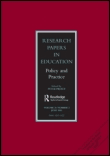
Research Papers in Education
Exploring innovative practices in teaching and learning.Research Papers in Education is a leading academic journal dedicated to advancing the field of education through the dissemination of high-quality research. Published by ROUTLEDGE JOURNALS, TAYLOR & FRANCIS LTD, this journal, with an ISSN of 0267-1522 and E-ISSN 1470-1146, has been pivotal in shaping educational discourse since its inception in 1986. The journal is recognized in the Q1 quartile for Education in the 2023 rankings and boasts an impressive 91st percentile in Scopus rankings. While it operates under a traditional subscription model, its reach is enhanced by its commitment to scholarly rigor, making it an indispensable resource for researchers, professionals, and students alike. Covering a diverse range of topics including pedagogical strategies, policy analysis, and educational technology, Research Papers in Education facilitates critical dialogue and innovation in the educational landscape, contributing significantly to the ongoing conversation around effective teaching and learning practices.

Guiniguada
Connecting academia and practice for transformative educational policies.Guiniguada is a leading open-access journal established in 2015, published by the University of Las Palmas de Gran Canaria within its Public and Scientific Diffusion Services. With its ISSN 0213-0610 and E-ISSN 2386-3374, the journal provides a platform for innovative research and critical discourse in the field of education sciences, fostering a multidisciplinary approach to educational practices and policies. Situated at the heart of Spain's vibrant academic community, Guiniguada aims to bridge the gap between theoretical frameworks and practical applications, making it an invaluable resource for researchers, educators, and students alike. As an open-access journal, it enhances the global dissemination of knowledge, ensuring that cutting-edge research is freely available to all. The journal's commitment to advancing educational research underscores its significance in shaping contemporary educational practices and influencing policy decisions.
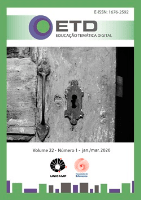
ETD Educacao Tematica Digital
Exploring New Frontiers in Digital LearningETD Educacao Tematica Digital is a distinguished academic journal published by UNIV ESTADUAL CAMPINAS, FAC EDUCACAO, and has been at the forefront of educational research since its inception in 2004. With a focus on digital education and thematic approaches, this open access journal facilitates the dissemination of knowledge and innovative practices in the field of education, making it an invaluable resource for researchers, educators, and students alike. Its dedicated editorial board fosters discourse on the integration of technology within educational frameworks, ensuring the publication of high-quality articles that resonate with contemporary challenges and advancements in education. The journal’s commitment to accessibility and scholarly rigor positions it as a leading venue for those seeking to advance their understanding and application of digital pedagogies. With the ISSN 1676-2592, ETD aims to contribute significantly to the global discourse on educational methodologies and digital learning environments.
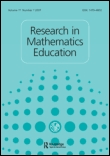
Research in Mathematics Education
Transforming Ideas into Impactful Mathematics Education ResearchResearch in Mathematics Education is a premier academic journal published by Routledge Journals, Taylor & Francis Ltd, focusing on the critical field of mathematics education. Established in 1998, this journal has earned a reputation for fostering innovative scholarship and research that advances the understanding of teaching and learning mathematics. With its impressive Q2 ranking in both Education and Mathematics (miscellaneous) categories for 2023, and a notable Scopus rank of 60th in General Mathematics, it serves as a vital resource for researchers, educators, and policymakers alike. While it does not offer Open Access, the journal’s rigorous peer-reviewed framework ensures that only high-quality articles are published, contributing significantly to both theoretical and applied aspects of mathematics education. Its commitment to excellence is reflected in its ongoing aim to disseminate impactful research, making it an indispensable resource in the academic and educational communities.

Journal of Mathematics Teacher Education
Fostering Excellence in Mathematics Teacher TrainingJournal of Mathematics Teacher Education, published by SPRINGER, serves as a pivotal platform for scholarly communication in the fields of Education and Mathematics. With a distinguished Q1 ranking in both disciplines and exceptional Scopus rankings—placing it in the top 94th percentile for Mathematics and the 84th percentile for Education—the journal is dedicated to advancing research and practice in mathematics education from a global perspective. Established in 2005 and converging towards 2024, it invites contributions that investigate innovative teaching strategies, curriculum development, and teacher education methodologies. Although the journal does not offer Open Access, its rich collection of empirical studies, reviews, and theoretical articles provides invaluable resources for educators, researchers, and students aiming to elevate the quality of mathematics instruction. Situated in Dordrecht, Netherlands, the Journal of Mathematics Teacher Education remains a significant asset to the academic community, fostering discussions that drive progress and enhance student learning experiences.
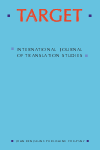
Target-International Journal of Translation Studies
Exploring the Depths of Communication and LinguisticsTarget - International Journal of Translation Studies, published by John Benjamins Publishing Co, stands as a leading academic forum in the fields of translation studies, communication, and linguistics. Established in 1989, this prestigious journal has successfully evolved, boasting a Q1 classification in 2023 within both Communication and Linguistics and Language categories, reflecting its significant impact and influence in these disciplines. With an impressive positioning in the Scopus ranks, it is recognized as one of the top journals in its field, being placed in the 88th percentile for Language and Linguistics, and in the 87th percentile for Linguistics and Language within the Social Sciences. Its rigorous scholarly contributions foster a greater understanding of translation practices, theories, and methodologies, making it an essential resource for researchers, professionals, and students alike. While it does not currently offer open access, its comprehensive articles and studies greatly enrich discussions and advancements in translation and communication studies.

Informatics in Education
Bridging Technology and Pedagogy for Tomorrow's EducatorsInformatics in Education is a premier academic journal published by Vilnius University, Institute of Mathematics and Informatics, focusing on the intersection of information technology and pedagogical innovation. With an ISSN of 1648-5831 and an E-ISSN of 2335-8971, this Open Access journal has been disseminating critical research since 2003, enabling widespread accessibility and collaboration across the global educational community. The journal's commitment to advancing the field is demonstrated by its impressive 2023 Category Quartiles: Q1 in Communication and Education and Q2 in Computer Science Applications, highlighting its significant impact on these disciplines. Located in Lithuania, Informatics in Education ranks impressively in Scopus, with a Social Sciences Communication rank of #54/511 (89th percentile) and a Social Sciences Education rank of #188/1543 (87th percentile). The journal's goals include fostering research that informs pedagogical practices and enhances educational outcomes through the innovative use of technology, ensuring it remains at the forefront of research in this vital field. Researchers, professionals, and students alike will find a wealth of knowledge within its pages to support their work and learning endeavors.

Translation & Interpreting-The International Journal of Translation and Interpreting
Exploring the Art and Science of Translation and InterpretingTranslation & Interpreting is the premier Open Access journal dedicated to the intricate fields of translation and interpreting, published by the University of Western Sydney's Interpreting & Translation Research Group. With an established reputation since its inception in 2009, this journal has quickly ascended to become a vital resource, recognized in the 2023 Q1 quartile rankings for both Linguistics and Language as well as Literature and Literary Theory. Its high standing is further supported by impressive Scopus rankings, placing it among the top journals in its field—#21 out of 1106 in Literature and Literary Theory and #204 out of 1088 in Language and Linguistics. With a commitment to disseminating original research and innovative practices, Translation & Interpreting serves as a crucial platform for scholars, practitioners, and students who aspire to deepen their understanding of translation dynamics and interpretation methodologies. Based in Australia, the journal actively contributes to global discourse by making research freely accessible, upholding the values of transparency and inclusivity in the academic community. Embark on your exploration of this influential journal that shapes the landscape of translation and interpreting research.
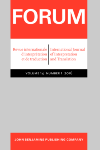
Forum-Revue Internationale d Interpretation et de Traduction-International Journal of Interpretation and Translation
Fostering Interdisciplinary Dialogue in Linguistics.Forum-Revue Internationale d’Interprétation et de Traduction - International Journal of Interpretation and Translation is a prestigious peer-reviewed journal published by John Benjamins Publishing Co, renowned for its contributions to the fields of linguistics and literary theory. With an ISSN of 1598-7647 and an E-ISSN of 2451-909X, this journal provides a vital platform for researchers, professionals, and students to disseminate and engage with innovative research findings and theoretical developments in interpretation and translation studies. As of 2023, it holds a respectable Q3 ranking in Linguistics and Language and a Q2 in Literature and Literary Theory, underscoring its growing influence within academia, reflected by its Scopus rankings. The journal encompasses a diverse array of perspectives and methodologies to enhance the understanding of translation practices and their implications in contemporary society. Although the journal operates within a limited open access framework, its commitment to high-quality scholarship makes it an essential resource for those seeking to contribute to and stay abreast of advancements in this dynamic field. Established to foster interdisciplinary dialogue, the journal invites submission from a wide range of scholarly approaches and encourages collaborative discourse among linguists, translators, and literary theorists.
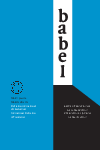
Babel-Revue Internationale de la Traduction-International Journal of Translation
Elevating Translation Studies to New HeightsBabel - Revue Internationale de la Traduction - International Journal of Translation, published by John Benjamins Publishing Co, is a leading scholarly journal that has established itself as a critical platform for research in the fields of translation studies, linguistics, and communication. Since its inception in 1955, Babel has provided a forum for academic discourse and has adapted through converged years to continuously reflect the evolving landscape of translation theory and practice. The journal is recognized for its high impact, achieving a Q1 ranking in Linguistics and Language and Q2 in Communication, making it relevant for both researchers and practitioners seeking to contribute to this dynamic area of study. With significant Scopus rankings in various categories, Babel is instrumental in promoting innovative research and fostering multidisciplinary dialogue. Although it does not offer open access, the journal is accessible through numerous academic institutions worldwide, ensuring that vital insights into translation practices and theories are disseminated effectively. Researchers, professionals, and students alike will find a wealth of knowledge and groundbreaking perspectives within its pages, making Babel an essential resource in the field.